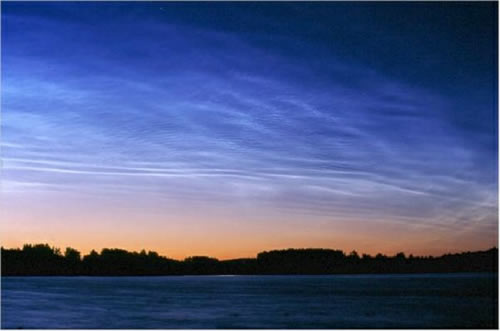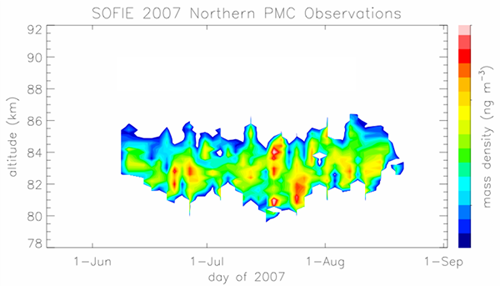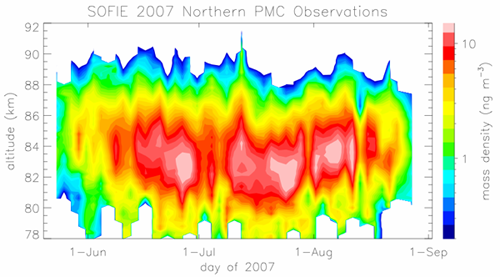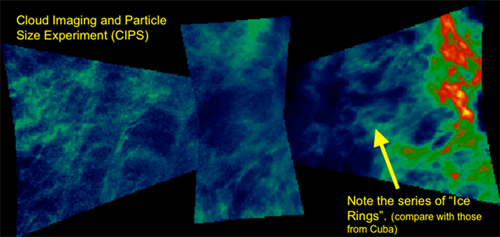| AGU Conference Presentation
Outline and Video
December 11, 2007
AIM SATELLITE REVEALS
UNPRECEDENTED VIEW OF MYSTERIOUS "NIGHT-SHINING"
CLOUDS
Results and Conclusions from the Aeronomy of Ice
in the Mesosphere (AIM) Mission’s First Global-Scale, Full-Season
View of Polar Mesospheric Clouds
Presenter:
Dr. James M. Russell III,
AIM Principal Investigator,
Hampton University
The AIM goal is to
determine why Noctilucent Clouds form and vary.

Photo Credit: Tom Eklund, July 28, 2001, Valkeakoski,
Finland
View Movies
Item
No. 1: Noctilucent Cloud Sightings
Item No. 2: What is a Noctilucent Cloud?
PMC brightness trends over the last 27
years
Credit: PMC trends from analysis of SBUV
satellite data performed by DeLand, Shettle, Thomas, and Olivero (JGR,
vol. 112, D10315, 2007)
The AIM Suite of Instruments
The AIM satellite has three scientific instruments on board:
the Cloud Imaging and Particle Size Experiment (CIPS), a four-camera system
that will study cloud morphology; the Solar Occultation for Ice Experiment
(SOFIE) that will measure the clouds and temperature and constituents
involved in their formation; and the Cosmic Dust Experiment (CDE) that
will measure one possible source of particles needed for cloud formation.
View Movie
Item
No. 3: Tour of the AIM Instruments
AIM Observes Ice Layer Not Previously Detected
The first season of AIM data shows that Polar Mesospheric
Clouds exist in a much broader altitude layer than was believed to be
the case before AIM was launched.

Before AIM - Ice layer was expected to exist in
a narrow altitude range centered around 52 miles

After AIM - Ice exists in one continuous layer extending
from 49 to ~ 56 miles altitude
High SOFIE sensitivity allows subvisible ice to be measured.
This was suspected from radar echos, but never observed before AIM.
Presenter:
Dr. Scott M. Bailey,
AIM Deputy Principal Investigator,
Virginia Polytechnic Institute and State University
PMC Seasonal Variability
View Movie
Item
No. 1: Full 2007 Season of North Polar Mesospheric Clouds
Presenter:
Dr. Gary E. Thomas,
AIM Co-Investigator
University of Colorado
“Ice Rings” from CIPS

Convective outflow boundaries off the coast of Cuba:
View Movie
Item
No. 2: Cloud Rings off the Coast of Cuba
A series of low-level convective outflow boundaries was
seen moving off the coast of Cuba on June 8, 2007 in
GOES-12 visible imagery.
|
